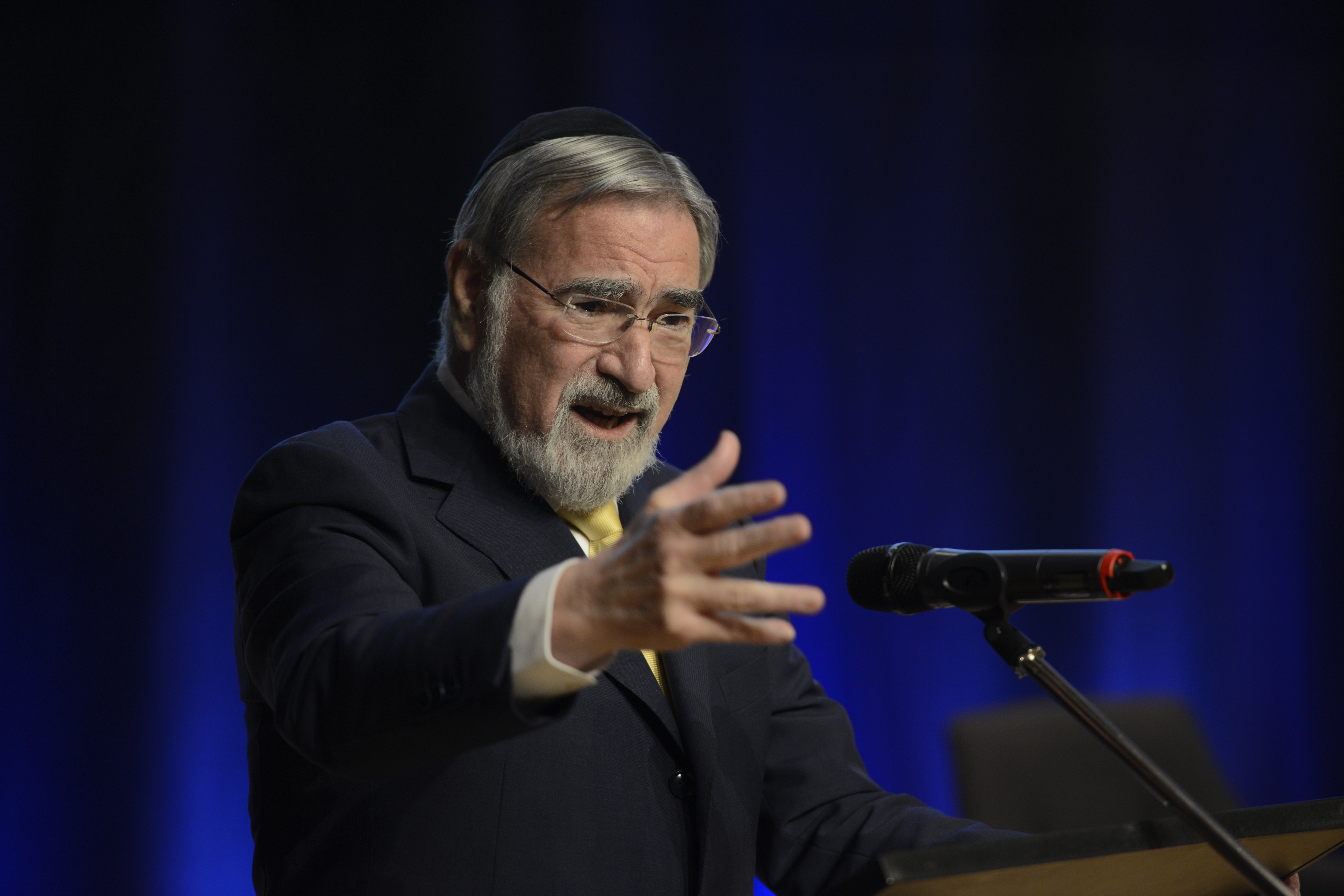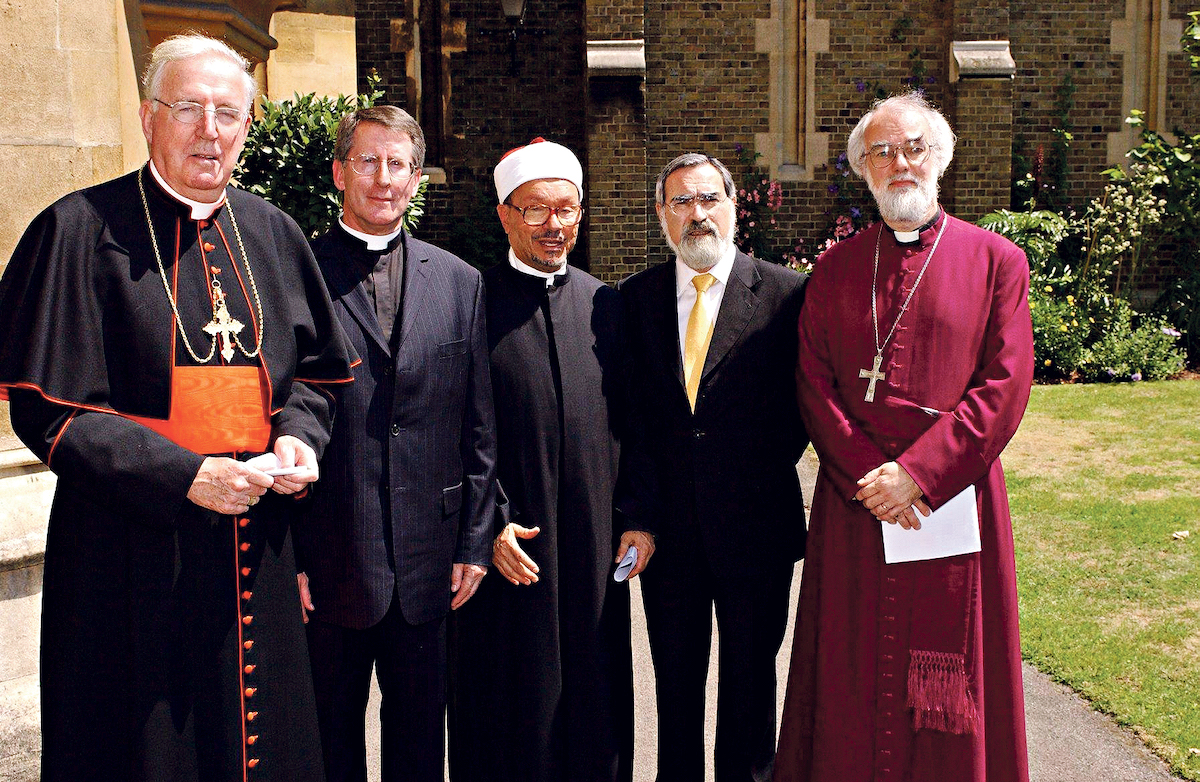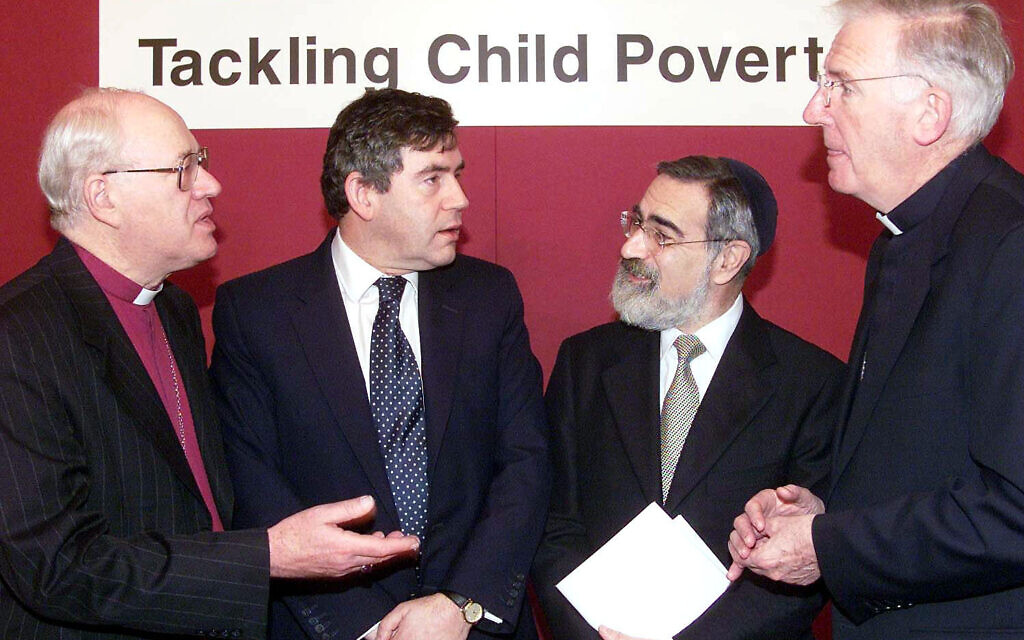GORDON BROWN: Jonathan’s moral leadership inspired a whole generation
FORMER PRIME MINISTER WRITES EXCLUSIVELY FOR JEWISH NEWS on how he sought Rabbi Sacks' advice on everything from antisemitism to the banking crisis.
The voice of Jonathan Sacks is silent today and words cannot adequately explain the personal loss I and so many now feel; and no single tribute can do justice to the lifetime achievements of such a great man.
For Jonathan was not only renowned for his leadership as Chief Rabbi; he was a philosopher, academic, writer, raconteur, broadcaster and teacher whose intellectual insights and moral leadership captured the imagination of a generation.
And he was also a great humanitarian to whom, whoever you were, you could go for advice, and whose reservoir of personal kindnesses seemed endless. I was one who benefited from his wonderful generosity of spirit.
Get The Jewish News Daily Edition by email and never miss our top stories Free Sign Up
Honours, accolades and titles followed him like night followed day, including his election at a young age as Chief Rabbi, and then his membership of the House of Lords, the prestigious Templeton prize and visiting professorships in almost every continent.
But, as Jonathan himself wrote in a memorable passage, what at life’s end he would value most was that he had helped his neighbour come to the aid of a family in need, assisted someone in distress, and comforted someone who was grieving. Such was his basic humanity that, as I found, his first concern was always the health and well-being of those he met.

When my daughter died, Jonathan was, for me and our family, a great source of strength; and I am grateful, too, that when I was under attack and even when I needed to clarify my thinking, Jonathan was there for me too.
My father, a Presbyterian minister, had chaired the Church of Scotland’s Israel committee over two decades and had visited Israel twice a year for 30 years; and I had grown up learning not only of the unspeakable evil of the Holocaust but also of the importance of Judeo-Christian ideas. But it was Jonathan who showed me – and us – the significance of these ideas for the new age we were living through, and, like so many others. my education would have been wholly incomplete without his teaching.
When my daughter died, Jonathan was, for me and our family, a great source of strength; and I am grateful, too, that when I was under attack and even when I needed to clarify my thinking, Jonathan was there for me too.
His writing – 28 books in as many years – was prodigious. Others took summer holidays: Jonathan used his time off from his pastoral work not to relax but to complete another book, and each one of them was born out of the best of scholarship and of the highest quality.
I first came across Jonathan when I read his pathbreaking book, The Politics Of Hope. There, writing of community as the often-ignored space between markets and states, he broke new ground, challenging both those who believed there is no such thing as society and those who believed in an economy based on command and control. I was surprised to be asked by Jonathan to write a preface to a new edition of such a highly influential book, but honoured to do so.

That was the 1990s, and before this new century has been shaped by extraordinary upheavals – 9/11, a global financial crisis, a decade of austerity, Brexit, rising pollution, and now a global pandemic. And at all times and throughout these crises, Jonathan has been a powerful voice explaining how, learning from these events, we can come together to build a better society.
When the financial crisis hit us in 2008, it was to Jonathan many of us turned to remind people of what too many had forgotten: that markets need morals. Markets may be value-free, but they can never be values-free. Like me, Jonathan saw the financial crisis as also a moral crisis: he recalled that the word ‘credit’ is more than an accounting term, but comes from the Latin credere, which means ‘to believe’ and who noted that the word ‘confidence’ was originally about far more than market sentiment and is derived from another Latin word, confider, which emphasises that trust is the only sure basis for successful commerce and industry.

His turn of phrase was immaculate. I recall him saying words to the effect that financiers had rewarded themselves with bonuses they did not need, for work they had not done, on the pretext of risks they had not taken, at the expense of impoverishing those who went without.
I recall, too, him warning us of the dangers of an over-materialistic debt-laden consumer culture that neglected the bonds of family and community: of an obsession with buying goods we did not need with money we did not have in the breathless pursuit of a happiness that could not last.
When the financial crisis hit us in 2008, it was to Jonathan many of us turned to remind people of what too many had forgotten: that markets need morals
After 2010, he took on many in his own community and beyond when he wrote The Dignity of Difference, a powerful call for all of us to build bridges across faiths. This was an important book that contained an accurate warning that terrorism flourishes when people are taught to believe coexistence is impossible. Inspired by him and many who share his views, that search to find common ground and move from the battleground of conflict to the high ground of cooperation and mutual understanding continues.
When I spoke out against antisemitism and expressed my shame at what had been allowed to happen within the Labour Party, what I said was much influenced by my conversations with him.
When Jonathan published his most recent book, Morality, I wrote to him saying I was nominating it as the book of the year. At yet another time of social and economic crisis, where we needed, as a country. Its chapters communicate his strong and enduring belief in fairness and social responsibility, in the need for an ethical foundation for all our lives and in the redemptive power of community. I believe the advice he gave us will stand the test of time, pointing us to the building blocks we need to fashion a more socially responsible post-Covid Britain.
I recall him saying words to the effect that financiers had rewarded themselves with bonuses they did not need, for work they had not done, on the pretext of risks they had not taken, at the expense of impoverishing those who went without
Jonathan could tell a story in a way others could not; he used illustrations from his own experiences to bring abstract concepts to life; he could bring an audience to its feet with memorable displays of humour, often directed against himself; and he could enrapture listeners far beyond the synagogue by the sheer eloquence and excellence of his oratory. He was the best type of teacher, somebody who communicated with passion what he knew and what he had learned, in the hope of creating a better world.
Our thoughts are with his wonderful wife, Elaine, and the children of whom he was so rightly proud, Joshua, Dina and Gila, and with the entire family.
Words may offer little consolation when the pain of loss is at its greatest, but I hope, over time, they will find comfort in the esteem, admiration and the respect in which Jonathan and the Sacks family is held across the country.
Yes, his voice may be silent, but he will live on everywhere in the influence he will continue to have on all of us whom he leaves behind.

Thank you for helping to make Jewish News the leading source of news and opinion for the UK Jewish community. Today we're asking for your invaluable help to continue putting our community first in everything we do.
For as little as £5 a month you can help sustain the vital work we do in celebrating and standing up for Jewish life in Britain.
Jewish News holds our community together and keeps us connected. Like a synagogue, it’s where people turn to feel part of something bigger. It also proudly shows the rest of Britain the vibrancy and rich culture of modern Jewish life.
You can make a quick and easy one-off or monthly contribution of £5, £10, £20 or any other sum you’re comfortable with.
100% of your donation will help us continue celebrating our community, in all its dynamic diversity...
Engaging
Being a community platform means so much more than producing a newspaper and website. One of our proudest roles is media partnering with our invaluable charities to amplify the outstanding work they do to help us all.
Celebrating
There’s no shortage of oys in the world but Jewish News takes every opportunity to celebrate the joys too, through projects like Night of Heroes, 40 Under 40 and other compelling countdowns that make the community kvell with pride.
Pioneering
In the first collaboration between media outlets from different faiths, Jewish News worked with British Muslim TV and Church Times to produce a list of young activists leading the way on interfaith understanding.
Campaigning
Royal Mail issued a stamp honouring Holocaust hero Sir Nicholas Winton after a Jewish News campaign attracted more than 100,000 backers. Jewish Newsalso produces special editions of the paper highlighting pressing issues including mental health and Holocaust remembrance.
Easy access
In an age when news is readily accessible, Jewish News provides high-quality content free online and offline, removing any financial barriers to connecting people.
Voice of our community to wider society
The Jewish News team regularly appears on TV, radio and on the pages of the national press to comment on stories about the Jewish community. Easy access to the paper on the streets of London also means Jewish News provides an invaluable window into the community for the country at large.
We hope you agree all this is worth preserving.
-
By Laurent Vaughan - Senior Associate (Bishop & Sewell Solicitors)
-
By Laurent Vaughan - Senior Associate (Bishop & Sewell Solicitors)
-
By Laurent Vaughan - Senior Associate (Bishop & Sewell Solicitors)
-
By Laurent Vaughan - Senior Associate (Bishop & Sewell Solicitors)






















